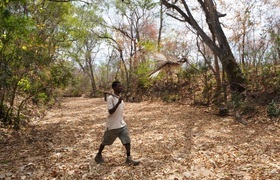Baptism of fire made easy for first-years
05 April 2004It's her first year as an electrical engineering student, her first time away from home and her first visit to Cape Town. In this respect, Tebogo Matshoge is like many UCT students, isolated from home and family and friends and new to a strange metropolis.
In addition, Matshoge has had to deal with the transition between school and university life and the stress of a heavy academic workload.
But help is now at hand for students like her, thanks to a pilot programme initiated by the Undergraduate Funding Office and the Student Psychological Service.
One-hundred-and-sixty students have been selected to take part in the Skills Development Programme, which will offer academic and personal development and will assist students in making a success of their stay at UCT.
According to psychologist Birgit Schreiber, the aim of the one-year programme is for students to develop skills in coping, stress management, time management, study techniques, communication and exam competence.
"We know that it is difficult for students to adapt to university life and we wanted to find a way of helping them to get through their degrees quickly and successfully.
"Although this programme is currently only for students on financial aid, we are aware of the need to expand it and to run it on a larger scale. The programme, therefore, acts as a research project for us in that we can evaluate its success after a year."
Speaking to students at the launch of the programme, Tasneem Salasa, director of the Undergraduate Funding Office, said an analysis of the performance of students on financial aid over the past five years had revealed that students had been struggling to come to terms with the stresses and strains of life at university.
"But I'm so glad that you have taken the initiative and decided to make use of the facilities now available. You are a special group and your feedback will pave the way for improved programmes being offered at UCT in the future."
SRC president Sicelo Mbambo also addressed the students and praised the university for taking a proactive step in addressing some of the problems that they face.
"These are skills that you can use throughout your career and out in society once you have graduated from UCT. I encourage you to identify the skills that you lack and work towards developing them. Take ownership of the process and take pride in the programme."
Schreiber explained that students will be divided into groups of approximately 20 and will meet twice a term when facilitators will take them through the process of acquiring the necessary skills.
"This also acts as a social network for the students. They begin to develop a greater sense of community and a sense of belonging," she said.
 This work is licensed under a Creative Commons Attribution-NoDerivatives 4.0 International License.
This work is licensed under a Creative Commons Attribution-NoDerivatives 4.0 International License.
Please view the republishing articles page for more information.










